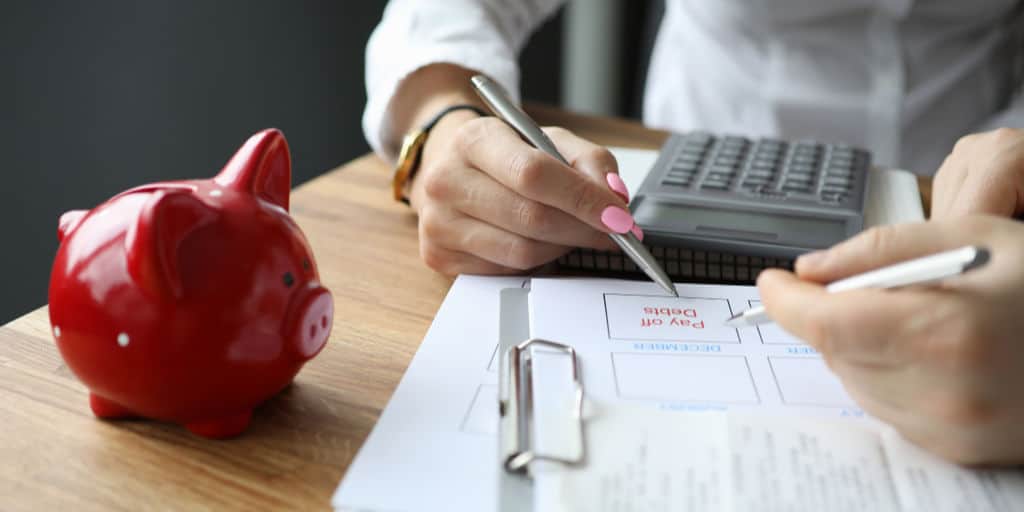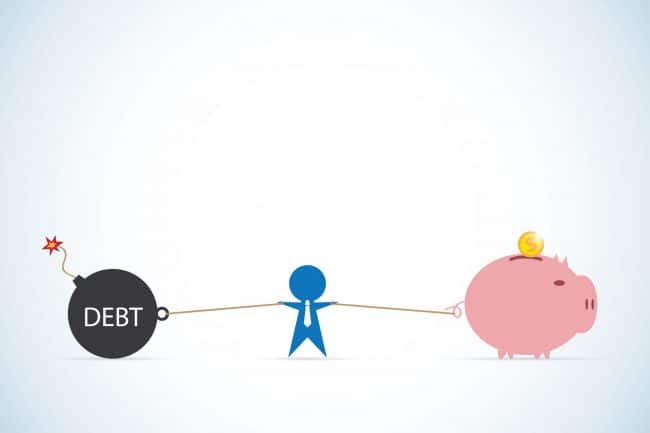Pay Down Debt First or Start Investing?
(This page may contain affiliate links and we may earn fees from qualifying purchases at no additional cost to you. See our Disclosure for more info.)
Getting ahead financially isn’t merely about earning more. It’s also about what you do with that money once you receive it.
Investing can help your net worth grow, but debt can eat away at it.
That means most people understand they need to invest and pay down debt. But it leaves a lot of people asking what they should do, pay down debt, or invest first.
There are important considerations to make when it comes to canceling your debt or investing more of your income.
To help you make the decision that’s best for you, let’s explore these considerations, as well as a sample plan, you can follow to answer the question once and for all.

A Refresher on Compounding
Before exploring the options of paying down debt or investing, it’s important to revisit the concept of compounding. There are times when compounding is a friend and other times when it’s a financial foe.
Knowing how compounding works can help you decide if you should pay down debt or invest first.
Compounding works in your favor when it comes to investing.
Here’s how: If you start with an initial investment amount of $5,000 and earn an estimated interest rate of 5%, your money grows to $21,609.71 in 30 years. You don’t have to make a single additional contribution.
Compounding simply goes to work, and you reap the benefits.
As magical as compounding seems, when you explore all the ways it can help your money grow, compounding can also be a huge financial hurdle.
While your investments compound, so does your debt. Depending on the interest rates associated with your debt, that debt can snowball very quickly.
This is especially true when the debt is considerably higher than the average rate of return in the stock market.
Grab a refresher on compounding here to see how your investments and debt can grow.
Things to Consider When Paying Down Debt
One of the most important things to consider when deciding if you should pay down debt first is what kind of debt you have.
You want to know the amount of debt and the types of debt you owe.
That helps you better understand the interest rates on your debt and other factors. For example, some types of debt, such as student loans, can be taken as a tax deduction.
Depending on your tax strategy and financial situation, it may make more sense for you to invest extra income rather than pay down these types of debt faster.
Another consideration is how the debt is impacting your life.
Hopefully, you already know how the debt is impacting your finances. But how is the debt making you feel?
If the debt is having a negative psychological impact on you, then you may choose to be more aggressive, paying down debt like a mortgage.
Things to Consider When Investing
Investing is not the same as saving, though we often use the words synonymously.
If you put your money in a federally insured high-interest savings account, you can sleep at night knowing the money will be there the next day.
Investing does not come with that same guarantee. That means you should not invest money you need to access immediately.
Investing should be considered a long-term financial strategy simply because of the natural fluctuations in the market. While investing is not a guarantee, it is one of the best ways to help your money grow and outpace inflation.
If you never invest, opting only to keep all of your savings in a savings account, there is a genuine possibility you will lose money to inflation.
If you keep $100,000 of your life savings in an account earning 1% interest, the money you earn is not keeping up with the inflation rate, which usually averages 2-3% per year.
That means most people need an investment strategy beyond a savings account.
A Sample Plan
No path is perfect, and no two people are on the same financial journey. There are compelling reasons to pay down debt first, and there are considerable advantages to investing more.
So do you choose to pay down debt or invest?
First, review the details of your unique circumstances. Then, use this sample plan to consider which money moves may be right for you.
Check on Your Emergency Fund
One of the first things you want to direct extra money toward is an emergency fund. You should do this before you start to pay down debt or invest.
When you’re trying to decide between paying down debt or investing, it may seem counterproductive to decide to do neither. However, you actually can’t afford to ignore this step.
By having an emergency fund of at least $1,000 in an easily accessible account (think high-interest savings accounts!), you don’t just get peace of mind; you get financial protection.
Thanks to this fund, you can mitigate a lot of issues that could crop up related to home and car repairs, medical issues, or even job insecurity. This emergency fund allows you to address emergencies without going into more debt or withdrawing from investments.
Learn more about how to get started with your emergency fund today.
Tackle High-Interest Debt First
People who argue that money will yield better returns in the market make that argument exclusive of high-interest unsecured debt.
When devising a plan to either pay down debt or invest, it's crucial to take an honest inventory of your finances. When you calculate your net worth, don’t just look at your total liabilities. Instead, focus on the interest rates associated with that debt as well.
Rather than investing, you want to cancel high-interest debt as quickly as possible. If you have credit card debt or other high-interest debt, you are likely paying between 15% and 25% interest on that debt.
Interest that high compounds so quickly, it will eat away your money faster than you can imagine.
Check out these tips to pay off credit card debt more effectively.
Grab Your Company Match
Once you have a plan to tackle your high-interest debt, you want to explore the possibility of getting a company match on your retirement savings account.
If your workplace offers an employer-sponsored retirement account, such as a 401k or a 403b, you may be eligible for something called a company match. Each plan is set up with different specifications.
Depending on your workplace offerings, your employer may match part, or all of your contributions to your retirement account, up to a certain percentage or dollar amount.
Here’s how a company match could work.
Let’s imagine you earn $50,000 a year, and you have a generous company plan matching 100% of your contributions, up to 3% of your salary.
That would mean your employer would add up to $1,500 to your retirement account, depending on how much you invest. For your employer to pay the full $1,500, you also need to invest that much, and thus meet your “match”.
Whether you want to think of this as not leaving money on the table or taking advantage of one of your workplace benefits, getting a match on your retirement account is important.
Discover ways you can maximize your 401k account here.

Evaluate Other Debt
Your high-interest debt is gone, and you’ve started working on your company match (if you have one). What comes next?
You want to return to the inventory that you took of your liabilities. What other debts do you owe, and what interest are you paying on them?
For some people, the psychological peace of mind that comes from eliminating all debt or not having a mortgage outweighs the fact that they might earn higher returns in the market.
At this point, you want to devise a plan that works for you.
Get Your Toes Wet
If you do not have access to an employer-sponsored retirement account or are not eligible for a company match, you likely want to start investing with a Roth IRA.
To get your toes wet, you can either open an investment account yourself or you can take advantage of robo advisors.
Investing can feel overwhelming, especially when you are first getting started and if there has been any market volatility recently.
It’s important to remember, most financial experts say the stock market returns an average of 8-10%.
While the yearly returns can be significantly more or significantly less, investing is one of the best ways to grow your money over the long run.
Because investing can be intimidating, you can start small.
Companies like Vanguard and Charles Schwab are lowering the minimums you need to open an investment account, and apps like Stash or Acorns allow you to get started with $0-$5.
Explore some of the other things beginner investors need to know before you take the plunge.
Pay Down Debt or Invest…or Both?
After you have mitigated risk with an emergency fund and paid off your high-interest debt, you have many options.
Many people ask themselves if they should pay down debt or invest, expecting an either/or answer.
The truth is, you do not have to choose to do one or the other. You may very well consider doing a combination of both.
One strategy that works well for some people is to consistently contribute to their retirement accounts each pay period. Then, in the event of a financial windfall, they put extra money toward their low-interest debt.
That might mean making an additional payment toward your mortgage principal after receiving a tax refund.
Being open to a bit of financial trial and error can help you devise a plan that fits your needs.
Paying down debt and investing at the same time might work for you. Or you might realize you feel more productive, focusing on one, and then moving to the other.
No one knows your financial situation better than you. So do the math and ask yourself what will make you feel more financially secure now, and in the future.
Further Reading: What is the 52-Week Savings Challenge?
Article written by Penny
